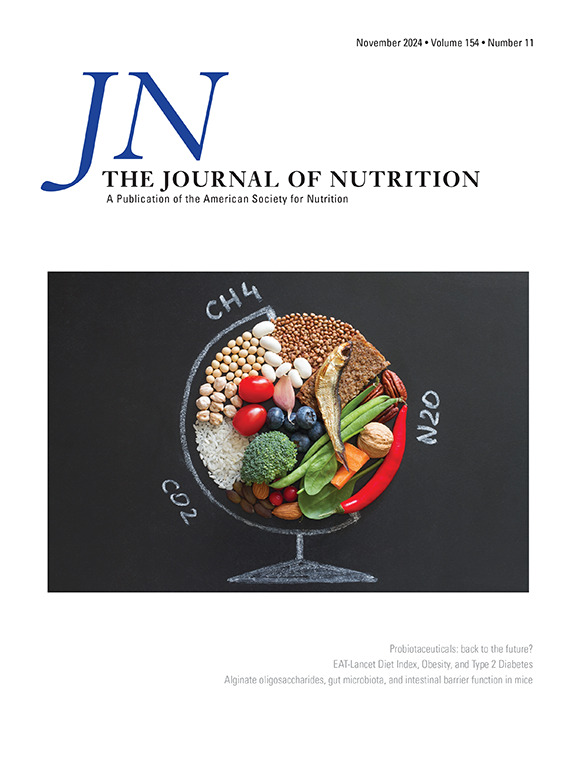餐前补充开心果对亚洲印度成年糖尿病患者心脏代谢危险因素的影响:一项随机对照试验。
IF 3.7
3区 医学
Q2 NUTRITION & DIETETICS
引用次数: 0
摘要
背景:亚洲印度人在较低年龄时易患2型糖尿病,并且经常食用高血糖负荷和低健康脂肪的饮食。目的:本研究旨在评估30 g早餐前和30 g餐前补充开心果12周对糖尿病前期亚洲印度人糖化血红蛋白(HbA1c)、其他血糖指标、人体测量和血脂的影响。方法:在一项为期12周的平行随机对照试验中,我们根据美国糖尿病协会的标准招募了120名糖尿病前期患者。干预组(n = 60)食用60克开心果(30克早餐前和晚餐前),而对照组(n = 60)遵循不含坚果的常规饮食。在基线和第12周,我们收集血液样本进行生化分析、人体测量和24小时召回。在试验的头两周和最后两周,参与者佩戴了连续血糖监测(CGM)传感器。尿n -甲基反式-4-羟基-l-脯氨酸(MHP)作为开心果摄入量的标志。结果:109名参与者完成了研究,随访率为90.8%。与对照组相比,干预组患者的HbA1c显著降低(组间平均差:-0.2;95%置信区间:-0.3,-0.1;P < 0.001],空腹或2小时葡萄糖负荷后血糖无显著变化。与对照组相比,干预组血清甘油三酯、腰围、脂质堆积积、内脏脂肪指数、动脉粥样硬化指数均显著降低。干预组尿MHP (mg/g肌酐)较对照组增高62% (P < 0.05)。CGM数据显示,与对照组相比,干预组在早餐后2小时曲线下增量面积(28%,p=0.01)和晚餐后(17%,p= 0.002)均显著减少。结论:12周餐前负荷60g开心果可降低糖尿病前期印度人的HbA1c并改善心脏代谢特征。这是第一批调查这一种族影响的研究之一。该研究已在印度临床试验注册中心注册为CTRI/2020/11/029340。本文章由计算机程序翻译,如有差异,请以英文原文为准。
Effect of Premeal Pistachio Supplementation on Cardiometabolic Risk Factors among Asian Indian Adults with Prediabetes: A Randomized Controlled Trial
Background
Asian Indians are susceptible to developing type 2 diabetes at a lower age and often consume diets that are high in glycemic load and low in healthy fats.
Objectives
This study aimed to evaluate the effect of 30 g prebreakfast and 30 g predinner supplementation of pistachios for 12 wk on glycated hemoglobin (HbA1c), other glycemic markers, anthropometry, and lipid profile of Asian Indians with prediabetes.
Methods
In a 12-wk parallel arm, randomized controlled trial, we recruited 120 participants with prediabetes based on American Diabetes Association criteria. The intervention group (n = 60) consumed 60 g pistachios (30 g prebreakfast and predinner) whereas the control group (n = 60) followed a routine diet that excluded nuts. At baseline and 12 wk, we collected blood samples for biochemical analysis, anthropometrics, and 24-h recalls. Participants wore a continuous glucose monitoring (CGM) sensor during the trial’s first and last 2 wk. Urinary N-methyl-trans-4-hydroxy-l-proline (MHP) was measured as a marker of pistachio consumption.
Results
A total of 109 participants completed the study (follow-up rate = 90.8%). Compared with participants in the control group, those in the intervention group had significant reductions in HbA1c (mean between-group difference: −0.2; 95% confidence interval: −0.3, −0.1; P < 0.001] with no significant changes in fasting or 2-h post glucose load plasma glucose. Compared with the control group, the intervention group had significant reductions in serum triglyceride, waist circumference, lipid accumulation product, visceral adiposity index, and atherogenic index. Urinary MHP (mg/g creatinine) showed a 62% increase in the intervention compared with the control group (P < 0.05). CGM data revealed significant decreases in the incremental area under the curve, 2-h after breakfast (28%, p=0.01) and after dinner (17%, P = 0.002) in the intervention group compared to the control group.
Conclusions
A 12-wk, premeal load of 60 g pistachios lowers HbA1c and improves cardiometabolic profile among Asian Indians with prediabetes. This is among the first studies to investigate these effects in this ethnic group.
This study was registered in the Clinical Trial Registry of India as CTRI/2020/11/029340.
求助全文
通过发布文献求助,成功后即可免费获取论文全文。
去求助
来源期刊

Journal of Nutrition
医学-营养学
CiteScore
7.60
自引率
4.80%
发文量
260
审稿时长
39 days
期刊介绍:
The Journal of Nutrition (JN/J Nutr) publishes peer-reviewed original research papers covering all aspects of experimental nutrition in humans and other animal species; special articles such as reviews and biographies of prominent nutrition scientists; and issues, opinions, and commentaries on controversial issues in nutrition. Supplements are frequently published to provide extended discussion of topics of special interest.
 求助内容:
求助内容: 应助结果提醒方式:
应助结果提醒方式:


